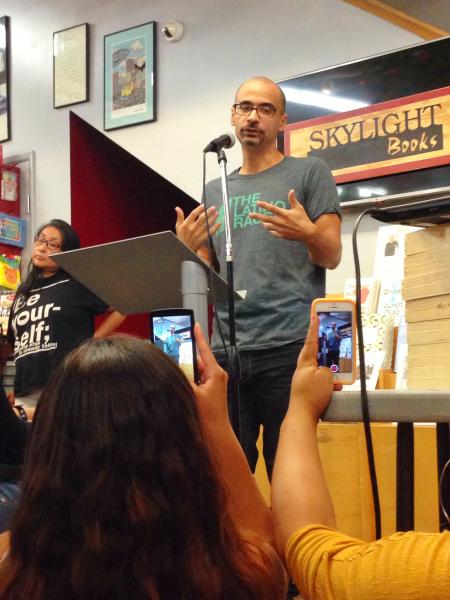Junot Díaz Uncensored

Upon arriving at Skylight Books in Los Felíz, Díaz helped create a welcoming environment in which everyone was comfortable shouting out questions and comments. With his frequent use of profanities, Díaz made it clear that this was not the palce for any suit-and-tie formality.
In his work, Díaz connects English, Spanish, and expletives seamlessly, never attempting to censor himself or concede to the reader. In an interview for BOMB Magazine in 2007, Díaz openly acknowledged his tendency to use strong language, asserting, “To keep it short: language has never been a good dog and its free exercise will never provide comfort to cultures of respectability. And I guess I’ve never really been one for comforting my readers either.”
To me, though, and many others, Díaz’s prose has always been a comfort. As he engaged in conversation with the massive audience crammed into the bookstore, he alternated between doling out impressive wisdom and accentuating his phrases with streams of obscenities. The latter had an enormously humanizing result.
Throughout his body of work, Díaz manages to be simultaneously vulgar and eloquent, and the result is seamless, yet patchwork, prose. There is a certain ingenuity to writing gritty, authentic characters in a gritty, authentic manner that he has truly mastered.
In response to my question regarding the generally accepted ban of cursing in formal writing, Díaz cautioned against the practice, sharing his opinion that “cursing has always been a way for us to shorthand discriminate against class others. In a country like ours, in a world like ours, class, of course, is deeply racialized.”
I have a tendency to demonstrate my full command of the English language, as I believe that there are instances when swearing is absolutely necessary and cathartic. When I expressed this sentiment to Díaz after his reading, he offered an interesting perspective. “When my students are like, ‘well I want to put cursing in[to my writing] because that feels natural,’ well I’m like, what feels natural is not what you need to be practicing as an artist. You know, if that’s your bag, never fucking curse for five years and then see what you’ve learned.”
Contact Staff Reporter Eliza Moley here or find her on Twitter here.



